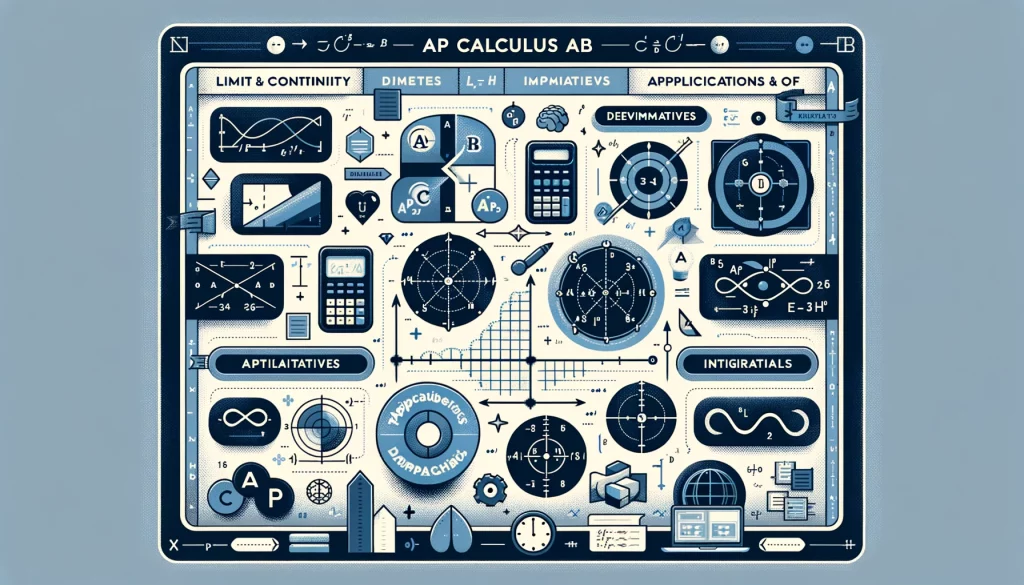AP Calculus AB: Complete Guide (2026)
AP Calculus AB is a rigorous college-level course for high school students. It covers the foundations of calculus—limits, derivatives, integrals—and how to apply them to solve complex mathematical and real-world problems, preparing you for the AP exam and further study in STEM.
What is AP Calculus AB?
AP Calculus AB is the entry-level calculus AP offered by College Board, equivalent to the first semester of college calculus. Students explore deep concepts of change, rates, and accumulation, gaining practical and theoretical skills vital for science, economics, and engineering.
- Topics: Limits, continuity, differentiation, applications of derivatives, integration, and applications of integrals
- Exam Format: Multiple-choice and free-response questions
- Scoring: 1–5 scale. Most colleges award credit for scores of 3+.
- Test Date: Annually in May. See the College Board for details.
How Does AP Calculus AB Work?
Course Structure & Success Path:
- Limits & Continuity: Learn what limits tell us about function behavior; determine where a function is continuous. (Limits, Continuity)
- Derivatives: Apply power, product, quotient, and chain rules to find derivatives. Analyze rates of change, slopes, maxima/minima, optimization—in depth guide Differentiation in IB/AB.
- Integrals: Develop techniques for definite/indefinite integrals. Solve area, accumulation, average value, volumes.
- Applications: Area under a curve, average value, motion problems, solids of revolution, work problems.
- Exam Skills: Multiple-choice for speed & accuracy. Free-response for method and explanation. Know all question types in advance.
- Common Pitfalls: Always show work, include integration constants, watch for dy/dx in implicit diff, group with parentheses correctly.
- Practice: Regular, timed problem sets. Practice with your AP Calculus AB Score Calculator.
- Review & Adjust: Use past AP exams and resources like the AP Calculus BC Score Calculator for extra challenge.
Frequently Asked Questions (FAQ)
What is the AP Calculus AB exam format?
The AP Calculus AB exam has two sections: Multiple-choice (Section I) and Free-response (Section II). Both sections test problem-solving, reasoning, and application. See College Board's official course page for details.
Is AP Calculus AB harder than AP Calculus BC?
AP Calculus BC covers everything in AB plus advanced topics like sequences and series. AB is a better starting course; BC is faster-paced.
Do you need to memorize formulas?
You should know all key formulas: limits, derivative rules, basic integrals, area/volume formulas. The exam does not provide a formula sheet.
How is the AP Calculus AB exam scored?
It uses a raw score conversion to a scale from 1–5. Scores of 3+/5 often earn college credit or advanced placement.
What are common mistakes in AP Calculus AB?
- Not showing intermediate work—lose partial credit
- Forgetting integration constants
- Mistaking average velocity for mean
- Errors with distribution, implicit differentiation, and parentheses
How can I improve my problem-solving?
- Practice different question types regularly
- Analyze errors and learn from mistakes
- Work on timed sets & review past AP exams
- Ask teachers or peers for help
What strategies help overcome AP exam anxiety?
- Prepare early; practice consistently
- Sleep well the night before; eat light before exam
- Tackle easy questions first
- Use positive self-talk and deep breathing
- See the test as an opportunity, not a threat
Where can I check my AP score or practice?
Use the AP Calculus AB Score Calculator or BC Calculator for instant online predictions.







